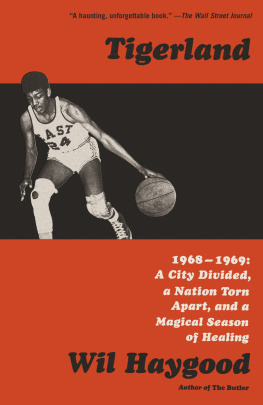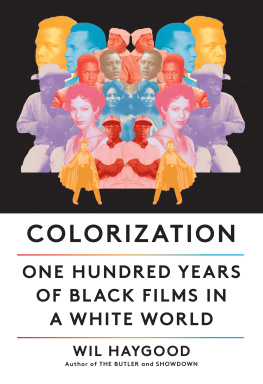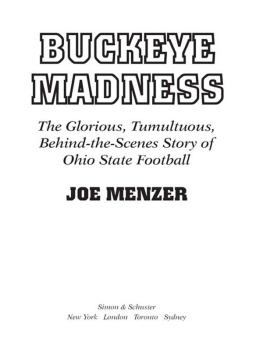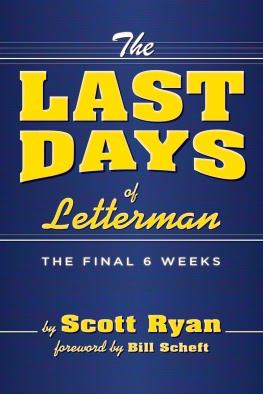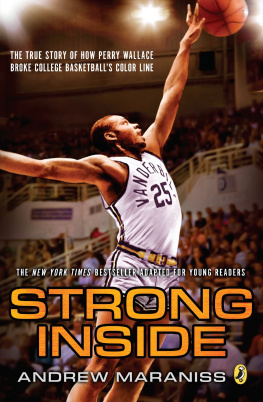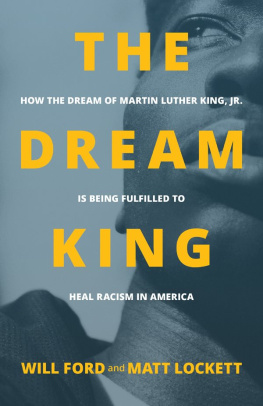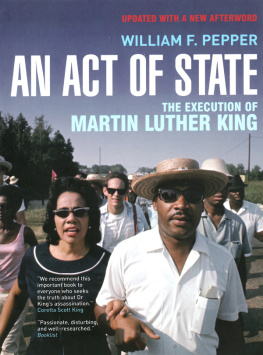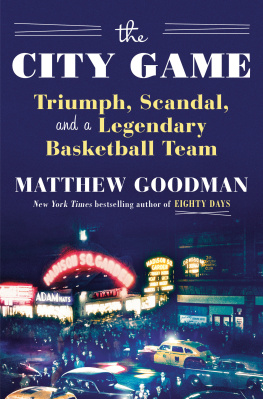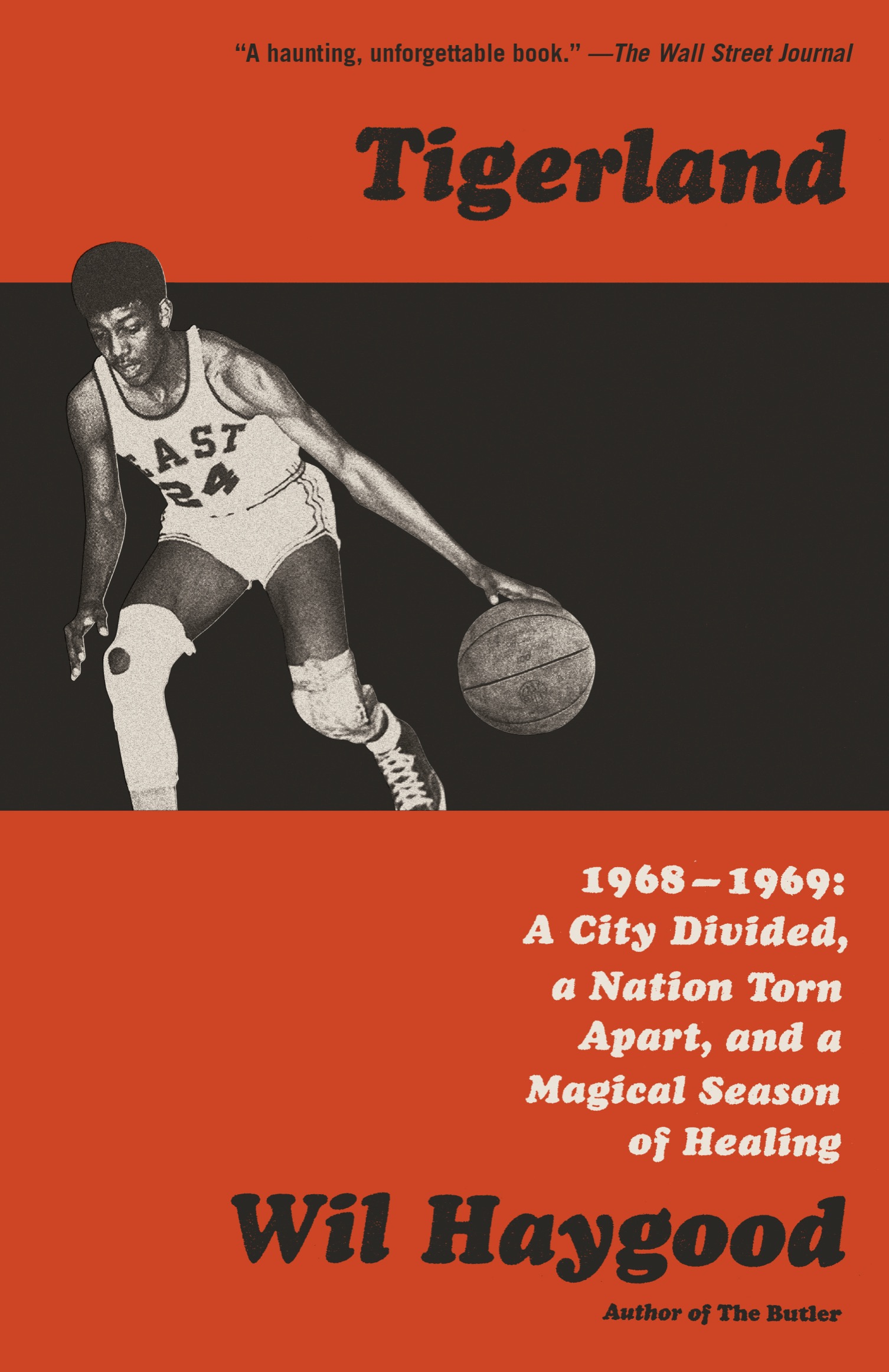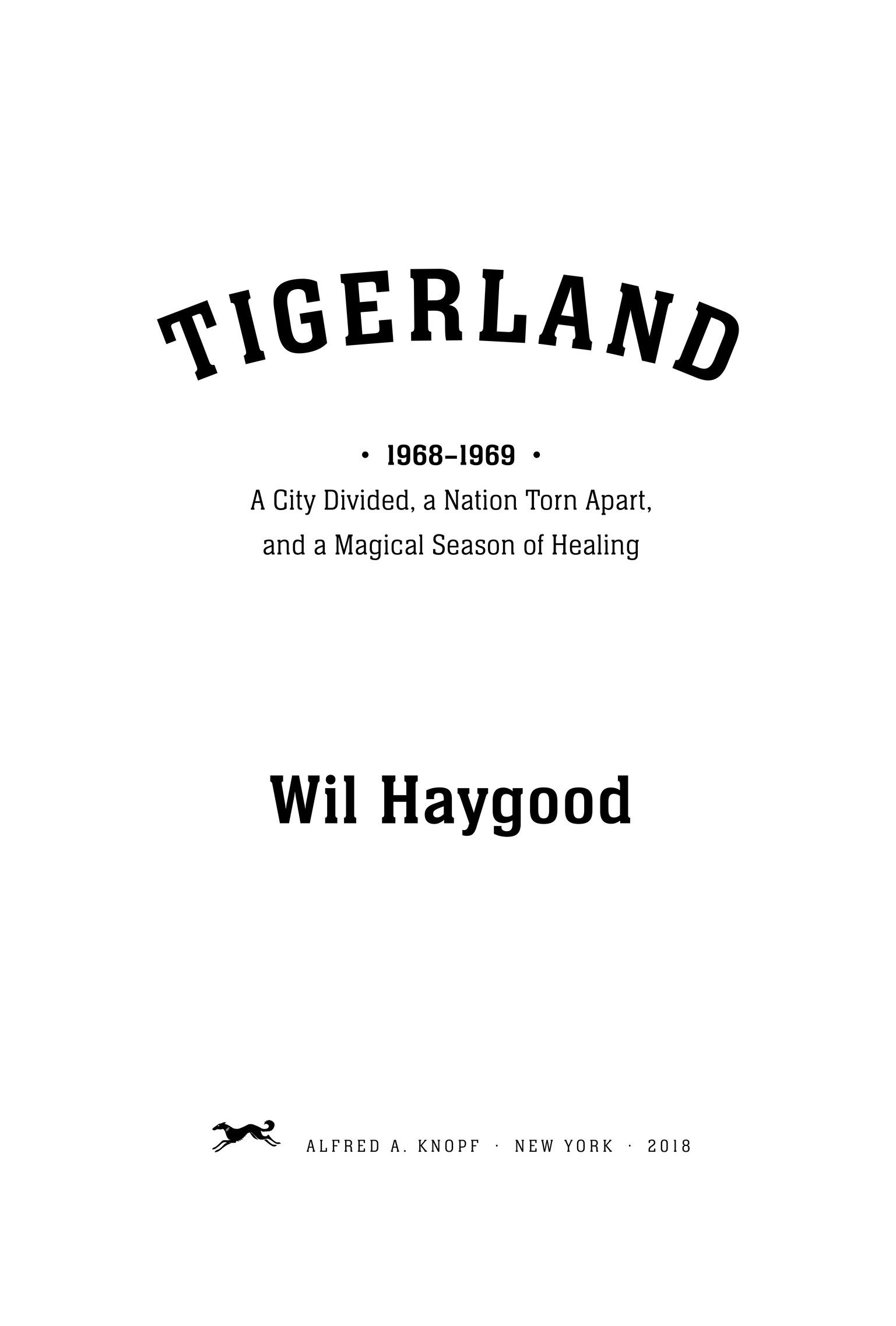ALSO BY WIL HAYGOOD
Showdown: Thurgood Marshall and the Supreme Court Nomination that Changed America
The Butler: A Witness to History
Sweet Thunder: The Life and Times of Sugar Ray Robinson
In Black and White: the Life of Sammy Davis Jr.
The Haygoods of Columbus: A Family Memoir
King of the Cats: The Life and Times of Adam Clayton Powell Jr.
Two on the River (photography by Stan Grossfeld)
THIS IS A BORZOI BOOK
PUBLISHED BY ALFRED A. KNOPF
Copyright 2018 by Wil Haygood
All rights reserved. Published in the United States by Alfred A. Knopf, a division of Penguin Random House LLC, New York, and distributed in Canada by Random House of Canada, a division of Penguin Random House Canada Limited, Toronto.
www.aaknopf.com
Knopf, Borzoi Books, and the colophon are registered trademarks of Penguin Random House LLC.
Library of Congress Cataloging-in-Publication Data
Names: Haygood, Wil, author.
Title: Tigerland : 1968-1969, a city divided, a nation torn apart, and a magical season of healing / by Wil Haygood.
Description: First edition. | New York : Alfred A. Knopf, 2018. | Includes bibliographical references.
Identifiers: LCCN 2018002138 | ISBN 9781524731861 (hardback) | ISBN 9781524731878 (ebook)
Subjects: LCSH : BasketballOhioColumbusHistory. | BaseballOhioColumbusHistory. | East High School (Columbus, Ohio)History | Race relationsOhioColumbusHistory. | Columbus (Ohio)Biography. | BISAC: SPORTS & RECREATION / Baseball / General. | SPORTS & RECREATION / Basketball.
Classification: LCC GV 885.73. C 65 H 68 2018 | DDC 796.32309771/57dc23
LC record available at https://lccn.loc.gov/2018002138
Ebook ISBN9781524731878
Cover design by Tyler Comrie
v5.3_r2.2
ep
For Phyllis Callahan, and Paul Pennell
& in memory of Jack Gibbs and Bob Hart
Contents
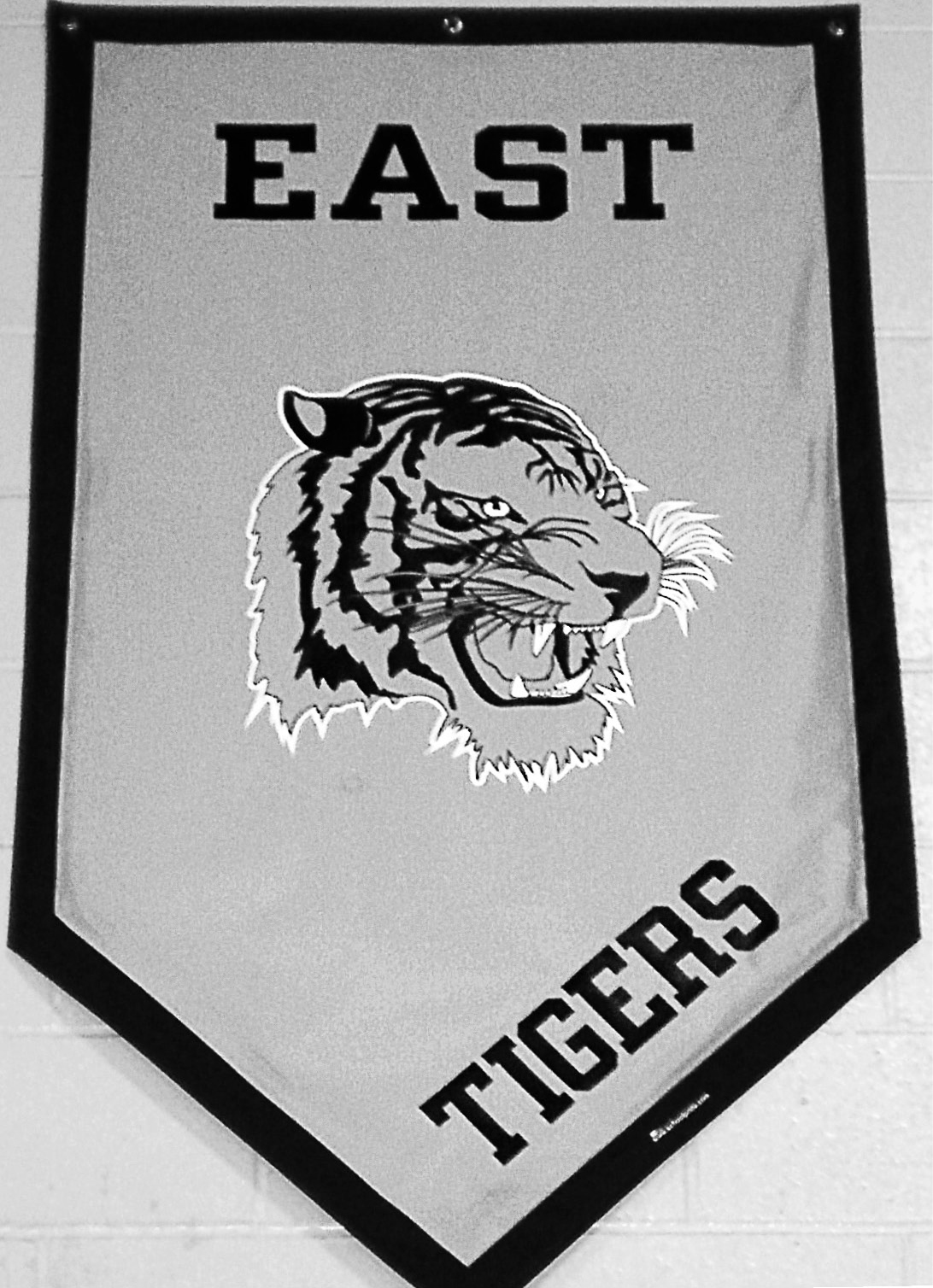
Prologue
1968
Reverend King Passed This Way
They were poor boys wedged into the turmoil of a nation at war and in the midst of unrest. They were the sons of maids and dishwashers and cafeteria workers, poor as pennies and too proud to beg, but not to ask or borrow. Their mothers were among the large waves of those who had come from the Deep South, a sojourn begun in the early part of the twentieth century known as the Great Migration. The Pacific coast and the Midwest were favored destinations. Families had fled by train or bus, escaping all those cotton fields and scenes of raw injustice. Columbus, Ohio, was a stop on the above-ground railroad where families had come praying for new opportunities. The boys fathers were mostly absent. Garnett Davis, the gifted third baseman on the baseball team, had a father, but he was stuck down in South Carolina, on a damn chain gang. Nick Conner, the pogo-jumping basketball player, had a father too, but one who had abandoned the family for another life in Cleveland. Basketball player Robert Wrights father had murdered a man. Kenny Mizelle, who played second base, sometimes dreamed about his dead father. At least thats what he had been told all these years, that his dad was dead. But he wasnt. Boys will be boys, and blood rolls thick, and when it comes to fathers, it often rolls backward. Their mothers could only implore them to look ahead, especially so because it was a tricky and dangerous time.
The year 1968 began convulsing and flaming its way toward 1969. There was deep tumult on the streets of America. Martin Luther King Jr. and Robert F. Kennedy had tried to do something about it allthe poverty, the absence of fathers that cut to the bone of despair, the pitiful condition of black men and the uneven social fabric of America. But these boys were athletessinewy, quick, and agile basketball and baseball playersblessed with a unique talent that, with the start of 1968, they were hoping could ward off the darkness that seemed to be engulfing their community. They were the Tigers of East High School.
Some of them lived in single-family homes that fronted a fertilizer plantand the obligatory railroad tracksjust off Leonard Avenue. Some lived in Poindexter Village, the government-funded public housing project, one of the first of its kind in the nation. (President Franklin D. Roosevelt had even come to the city for the dedication. Crowds had lined the streets as he cruised by in a convertible.) Still others lived in old apartment buildings behind Mount Vernon Avenue, where the bars and speakeasies were, where the gamblers sauntered about like roosters. Laws and boundaries had been drawn against their families long before they were born, consigning them to a segregated world on the East Side of this midwestern city. They were black boys in a white world, running, jumping, and excelling inside that world.
They played most of their basketball games through that cold winter in a converted rodeo cow palace on the Ohio State Fairgrounds, where you could still get whiffs of the horse manure, but no one seemed to mind as the East High Tigers couldnt stop winning. The gym at the high school couldnt accommodate the thousands who wanted to see them play. Their games were often broadcast on radio, an uncommon occurrence at the time for any high school basketball team. Come baseball season the crowds vanished. At the away baseball games, there would sometimes be only one fan in the bleachers rooting for the Tigers, and that was the coachs wife. The boys actually didnt mind playing their baseball games away, in and around rural Ohio, because the baseball diamonds were better at the other schools. They simply set about swinging their bats and blasting the ball into the cornfields. They looked like figures out of Negro league baseball, that professional and segregated league which was by now almost two decades removed from existence. The umpireswhite men raised in segregationsometimes would gawk at the East High players with awe. They were so proud at games end, tired and smiling as the farmland receded into view on the ride back home. The proud black boys never complained about the well-to-do schools and all their fancy equipment. They realized they didnt have the luxury of escaping the crazy and murderous times. They were in the center of it all.
Martin Luther King Jr.s presence hovers over that season. Rev. Phale Hale was the unofficial minister of the East High basketball and baseball teams. He had known King from his own Georgia days and was the first to bring the prophet of black America to Columbus. The gunning down of King in Memphis on April 4, 1968, was an awful deed that unleashed riot and rebellion from Los Angeles all the way to the east coast itself. Small pockets of Columbus burned on the citys East Side. In nearby Indianapolis, 168 miles west of Columbus, Bobby Kennedy spoke movingly of Kings death, and blacks and whites were weeping around him like a gospel chorus. Then, like King, Kennedy also fell after being shot by a crazed assassin. Hale had counseled these East High athletes with King-like optimism. He had told them to hold on. He had told them change was going to come. Now, with Kings death, Hale, who had given the citywide eulogy for King, was himself emotionally spent. King and his wife, Coretta, had slept in Rev. Hales home. It seemed, at ground level, that a nation was unraveling.

